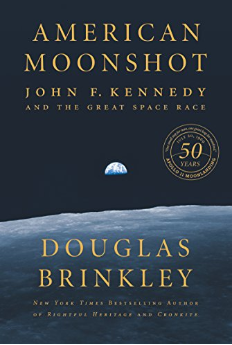I am writing this review on the day of the 50th anniversary of the moon landing. As a 13 year old in 1969 I watched every minute of the television coverage of this stupendous event. 50 years later the story of man’s first landing on the moon is still intriguing to me, and that’s why I wanted to read Douglas Brinkley’s American Moonshot: John F Kennedy and the Great Space Race.
For anyone who wants a better understanding of the roots of America’s space program, this is the book for you. Brinkley’s main focus is on John F Kennedy and German rocket scientist Wernher Von Braun. “German ballistic missile technology—built to kill people—laid a foundation for spaceflight,” Brinkley writes. It isn’t until the 8th chapter until Brinkley discusses America’s first manned ventures into space – project Mercury. That’s how extensive Brinkley’s research is into the early lives of Kennedy and Von Braun and the events that would later lead to America’s space program.
In reading American Moonshot I came to realize what a tremendous risk JFK took in issuing his 1961 challenge to complete a successful moon landing by the end of the decade. “Even Kennedy’s own national security advisor, McGeorge Bundy, thought the whole moonshot gambit scientifically reckless, politically risky, and a ‘grandstanding play’ of the most outlandish kind; and he had the temerity to voice his opinion in no uncertain terms to the president,” Brinkley relates.
This book is not a detailed account of the American space program in the 1960’s, rather the focus is on JFK’s and Von Braun’s roles in what eventually was a monumental success. “World leaders such as Khrushchev, Eisenhower, de Gaulle, Churchill, Macmillan, and Adenauer had been born in the nineteenth century; Kennedy and von Braun were, by contrast, beguiling twentieth-century futurists who understood that the key dividing line in geopolitical terms was no longer BC and AD. It was now pre-V-2 and post-V-2, as well as pre-Hiroshima and post-Hiroshima,” Brinkley writes.
“We choose to go to the moon—we choose to go to the moon in this decade and do the other things, not because they are easy, but because they are hard, because that goal will serve to organize and measure the best of our energies and skills, because that challenge is one that we are willing to accept, one we are unwilling to postpone, and one which we intend to win,” Kennedy said in that 1961 speech. American Moonshot gave me a greater appreciation of what an incredible undertaking and accomplishment the effort to land the first man on the moon was.




